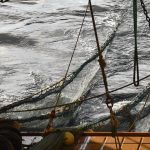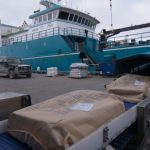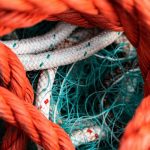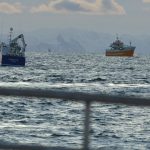An innovative partnership between scientists and the Devon beam trawler fleet aimed at helping to protect fish stocks, has led to skippers reducing the amount of juvenile fish discarded overboard by 57 percent, according to results announced today (Thursday, 3 December 2009).
This unprecedented success has been achieved, using modified nets as part of a revolutionary approach that uses a deep understanding of the behaviour and attitudes of fishermen. Previously this technique had only been used in health campaigns to change the public’s lifestyles to reduce the UK’s levels of cancer, obesity and sexually transmitted diseases.
Cefas scientists have worked closely with trawlermen who have volunteered to be involved in the project. Working in partnership they have drastically reduced the number of juvenile fish discarded overboard (typically because they have no market value or legislation forbids their landing and sale). Discarding is widely regarded as a waste of natural resources, disruptive to marine ecosystems and ethically undesirable. Before the trials, the Devon beam trawl fleet had one of the highest discard rates of English and Welsh fisheries.
Nicknamed Project 50% by all those involved, the voluntary trials aimed to reduce the number of juvenile fish thrown overboard by 50 percent. Many industry experts believed this to be an unrealistically high target, however the results published today show an unprecedented average reduction of 57 percent.
Dr Andy Revill of Cefas, the Project Manager for the Project 50% explains: “We have been working to reduce discards with fishermen for a number of years, but it has been hard to achieve lasting results. I had read about social research methods and so approached Defra to fund this pilot project to see if this would help fishermen develop more sustainable practices for themselves.”
Dr Revill continues: “The starting point is to understand the lives and attitudes of fishermen in detail, so that we could successfully work in partnership to achieve the desired results. Because we now have a much better understanding of what it’s like to be a trawlerman, and have built theproject from the bottom up, the fishermen have achieved amazing results. They have been inspired by this approach and taken pride in what they have achieved.”
The full results of the trials are being launched at an event in Exeter today, by Michael Caines, the Devon-based celebrity chef. He is an enthusiastic supporter of the project: “Fishing has been carried out from Brixham and Plymouth for almost 1,000 years, with the area being famous for its high-quality deep sea fish such as sole, turbot and plaice together with wonderful cuttlefish and scallop. I am really proud of the way fishermen have volunteered to reduce their catches of juvenile fish to protect stocks.”
Trawlermen have been looking at ways to ensure the results of this project are not just a “one off”. In a further development to make positive changes towards sustainable fishing practice, South West producer organisations and trawler owners have also announced today that they are working towards Marine Stewardship Council accreditation, for its key fisheries.








